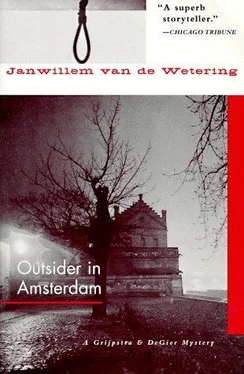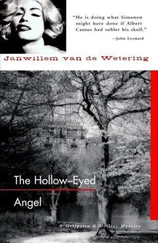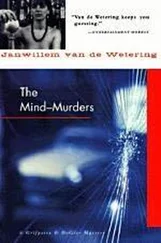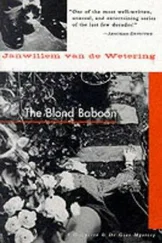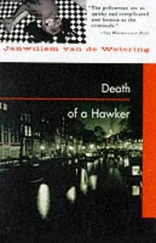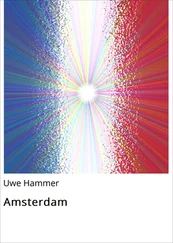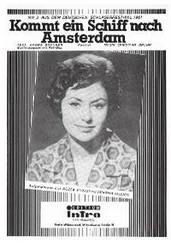Janwillem De Wetering - Outsider in Amsterdam
Здесь есть возможность читать онлайн «Janwillem De Wetering - Outsider in Amsterdam» весь текст электронной книги совершенно бесплатно (целиком полную версию без сокращений). В некоторых случаях можно слушать аудио, скачать через торрент в формате fb2 и присутствует краткое содержание. Жанр: Полицейский детектив, на английском языке. Описание произведения, (предисловие) а так же отзывы посетителей доступны на портале библиотеки ЛибКат.
- Название:Outsider in Amsterdam
- Автор:
- Жанр:
- Год:неизвестен
- ISBN:нет данных
- Рейтинг книги:4 / 5. Голосов: 1
-
Избранное:Добавить в избранное
- Отзывы:
-
Ваша оценка:
- 80
- 1
- 2
- 3
- 4
- 5
Outsider in Amsterdam: краткое содержание, описание и аннотация
Предлагаем к чтению аннотацию, описание, краткое содержание или предисловие (зависит от того, что написал сам автор книги «Outsider in Amsterdam»). Если вы не нашли необходимую информацию о книге — напишите в комментариях, мы постараемся отыскать её.
Outsider in Amsterdam — читать онлайн бесплатно полную книгу (весь текст) целиком
Ниже представлен текст книги, разбитый по страницам. Система сохранения места последней прочитанной страницы, позволяет с удобством читать онлайн бесплатно книгу «Outsider in Amsterdam», без необходимости каждый раз заново искать на чём Вы остановились. Поставьте закладку, и сможете в любой момент перейти на страницу, на которой закончили чтение.
Интервал:
Закладка:
Van Meteren smiled.
"Joachim was a bit like Piet. Very quiet, very secretive. He never boasted. People who don't boast are very remarkable."
"And dangerous," Grijpstra said.
"And dangerous. Joachim found heroin and sold it to Piet. But Piet had to pay in cash. Joachim wasn't going to lend him the merchandise. So Piet mortgaged his two houses, gave Joachim the money and received the heroin."
"Cash on the barrelhead," de Gier said.
"Ahoy," Runau shouted and the detectives joined him. A low gray speedboat was approaching the hotter. Two policemen, carbines at the ready, stood on the forecastle. The boat was approaching them at speed, its bow cutting the silent lake and causing a high sparkling white wave.
"Cut the engine," de Gier said to Runau, "or they may fire at us. We have had enough action today."
Grijpstra went back into the cabin.
"We have company," he said to van Meteren. "You'll be in the hospital soon. So you have the heroin now, haven't you?"
"The lot," van Meteren said, "and it will never reach the users. Heroin is the end of everything. Piet wouldn't believe me when I tried to tell him. Hash is all right perhaps but I saw a lot of heroin addicts when I walked the streets as a traffic warden. They were all dying. Heroin is the evil spirit itself, it goes straight into the blood and it will never let go. It makes puppets out of us, crazy puppets who won't last."
"That's why you hung him?" Grijpstra asked. "Why not tell us?"
"You would have jailed him for a bit," van Meteren said. "The police can't change the law. I could, but no judge will believe me when I say that I killed him to stop him."
The police boat touched the botter.
"What would you have done if we hadn't caught you?" Grijpstra asked.
"Waited for at least a year, sold the botter and the Harley and gone back to New Guinea."
"As King Doodle the First?" Grijpstra asked. "Would you have become a king? Or an admiral of a pirate fleet of war canoes?"
Van Meteren smiled.
"Perhaps. I might have become a hermit, who knows. There are a lot of small islands in my country. I might have, retired and lived with the animals."
"And the heroin?"
"I would have destroyed it. But I always reckoned with the chance that you might catch me so I kept it for the time being. It may still serve a purpose."
"Morning," said the policeman who entered the cabin. "Is that fellow the prisoner?"
"He is," Grijpstra said.
"Wounded, is he? We'll let him stay where he is and you can follow us. I'll radio for an ambulance. We'll be in the harbor within half an hour. They can take him straight to the hospital."
"Thanks," Grijpstra said.
"We have looked everywhere for your boat," the policeman said, "and all we found were fishermen, cursing us because we were disturbing the fish with our bow wave."
"It's a hard life," de Gier said.
Grijpstra looked at the water policeman, a strong healthy looking giant with a suntanned face.
"What a life," Grijpstra thought, "play around on the water all day."
Van Meteren laughed, he had read Grijpstra's thoughts.
\\\\\ 16 /////
The Chief Inspectorsat behind his desk, watching his cactus, which showed signs of growing a branch. The future branch was still no more than a slight swelling and might be a mere bump, some sort of infection, a wound perhaps, but it might also be a bud. Perhaps the cactus was trying to develop a flower. The ehief inspector was considering whether he should cut if off. The bump, wound, growth or bud was spoiling the straightness of his plant.
He shook his head irritably. Perhaps the growth would be interesting. He closed the small penknife that had been lying on his desk for some time and put it back into his pocket.
The room was stuffy, filled with a damp heat being wafted through the open windows by a listless draft that might, later in the day, develop into a breeze. The heat had a slight smell of a hospital.
The chief inspector opened his nostrils and breathed deeply.
The smell made him think again of the Papuan who had been sitting at the other side of his desk, a little while ago. The Papuan had been flanked by his two captors. He brought some order in his thoughts.
"They caught him," he thought. "They had to shoot him to catch him but they merely winged him. Good work. An insignificant wound that is healing already. And they took him here. An arrested murderer. Took a long time though, three weeks is a long time. But he was clever. An intelligent man. And a dangerous man, no doubt about it. A trained killer, properly trained. And now they say he is trustworthy."
He closed his eyes and the orderly thoughts flaked off into a hazy pattern of hardly connected and only partly formed images. Papuans, he thought, wild men from the early ages. He saw the wild men from the early ages who once populated the swamp that, now, today, was called Holland. Powerful small men, bearded and lowbrowed, huddled near their campfires, exhausted from a buffalo hunt or an attack on a competing tribe's close-by village.
"Then the Romans came," the chief inspector thought. "In New Guinea the Dutch came. Some of our wild men must have joined the Roman army and some of them must have seen Rome. And now a Papuan has come to Amsterdam."
He got up and looked out of the window.
Grijpstra had made a proposition, a proposition inspired by an idea of the Papuan. The Papuan had lost his rights, he had been arrested, a prisoner's requests are of little consequence.
He looked at his cactus again, the enormous green phallus, the thorned phallus.
He had been requested to release a murderer, for a limited period of time of course. But a free man can escape. He turns a corner, he runs, he catches a streetcar or jumps on a bicycle. There are a lot of bicycles in Amsterdam.
He picked up his phone.
"The commissaris is ill today, sir," a girl's voice said. The chief inspector put his hand over the phone, swore, took his hand off the phone, thanked the girl, and rang off.
He dialed again.
"My husband is suffering of an attack of rheumatism, he is in the bath. It eases the pain, he says. Can I give him a message?"
The chief inspector thought.
"I really have to speak with-your husband, madame," he said.
"One moment."
The chief inspector waited.
"Could you come here?"
"Right away," the chief inspector said. "I'll be with you in fifteen minutes."
The chief inspector sat on a wooden footstool and looked at the commissaris' head. He had placed himself in such a position that he couldn't see more than the commissaris' head. The commissaris was in his bath, stretched out on his back, hands folded on his small, round, old man's belly which, if the chief inspector could have seen it, would have reminded him of an old-fashioned pith-helmet. "Well?" the commissaris asked.
The chief inspector spoke for some ten minutes. The commissaris interrupted him only once. He wanted one of his small cigars, from a box which the chief inspector found on the bathroom floor. The chief inspector lit the cigar and placed it carefully between the commissaris' thin bloodless lips.
The commissaris inhaled, puffed, and began to cough. The chief inspector removed the cigar.
"All right," the commissaris said.
"All right," Grijpstra said and put the phone down.
De Gier jumped from his chair.
"They agree?" he asked unbelievingly.
Grijpstra nodded.
"But if anything goes wrong the case is all ours again."
De Gier laughed.
"What would you expect?" he asked.
Grijpstra smiled. "I didn't expect them to agree."
"No," de Gier said. "I didn't expect them to agree either but perhaps they should have agreed. The police have always used methods like that."
Читать дальшеИнтервал:
Закладка:
Похожие книги на «Outsider in Amsterdam»
Представляем Вашему вниманию похожие книги на «Outsider in Amsterdam» списком для выбора. Мы отобрали схожую по названию и смыслу литературу в надежде предоставить читателям больше вариантов отыскать новые, интересные, ещё непрочитанные произведения.
Обсуждение, отзывы о книге «Outsider in Amsterdam» и просто собственные мнения читателей. Оставьте ваши комментарии, напишите, что Вы думаете о произведении, его смысле или главных героях. Укажите что конкретно понравилось, а что нет, и почему Вы так считаете.
